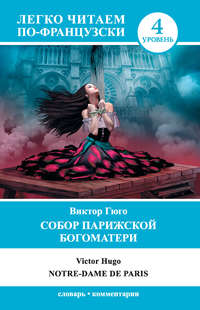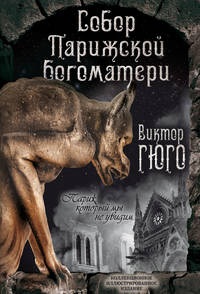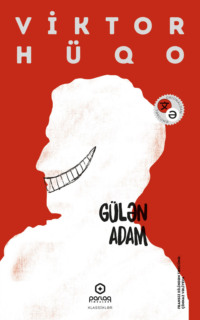 полная версия
полная версияLes Misérables, v. 3
"There's something falling," his wife cried.
"What is it?" her husband asked.
The woman had bounded forward, and picked up the lump of plaster wrapped in paper, which she handed to her husband.
"How did it get here?" Thénardier asked.
"Why, hang it!" his wife asked, "how do you expect that it did? Through the window, of course."
"I saw it pass," said Bigrenaille.
Thénardier rapidly unfolded the paper, and held it close to the candle.
"Éponine's handwriting – The devil!"
He made a signal to his wife, who hurried up to him, and showed her the line written on the paper, then added in a hollow voice, —
"Quick, the ladder! we must leave the bacon in the trap, and bolt."
"Without cutting the man's throat?" the Megæra asked.
"We haven't the time."
"Which way?" Bigrenaille remarked.
"By the window," Thénardier replied; "as Ponine threw the stone through the window, that's a proof that the house is not beset on that side."
The mask with the ventriloquist voice laid his key on the ground, raised his arms in the air, and opened and shut his hands thrice rapidly, without saying a word. This was like the signal for clearing for action aboard ship; the brigands who held the prisoner let him go, and in a twinkling the rope-ladder was dropped out of window and securely fastened to the sill by the two iron hooks. The prisoner paid no attention to what was going on around him; he seemed to be thinking or praying. So soon as the ladder was fixed, Thénardier cried, —
"The lady first."
And he dashed at the window; but as he was stepping out, Bigrenaille roughly seized him by the collar.
"No, no, my old joker, after us!" he said.
"After us!" the bandits yelled.
"You are children," said Thénardier; "we are losing time, and the police are at our heels."
"Very well, then," said one of the bandits, "let us draw lots as to who shall go first."
Thénardier exclaimed, —
"Are you mad? are you drunk? Why, what a set of humbugs; lose time, I suppose, draw lots, eh, – with a wet finger, a short straw, write our names and put them in a cap – "
"Would you like my hat?" a voice said at the door.
All turned; it was Javert, who held his hat in his hand and offered it smilingly.
CHAPTER XXI
ALWAYS BEGIN BY ARRESTING THE VICTIMS
Javert posted his men at nightfall, and ambushed himself behind the trees of the Rue de la Barrière des Gobelins, which joins No. 50-52 on the other side of the boulevard. He had begun by opening his "pocket," in order to thrust into it the two girls ordered to watch the approaches to the den, but he had only "nailed" Azelma. As for Éponine, she was not at her post; she had disappeared, and he had not been able to seize her. Then Javert took up his post, and listened for the appointed signal. The departure and return of the hackney coach greatly perplexed him; at length he grew impatient, and feeling sure that there "was a nest there," and of being in "luck's way," and having recognized several of the bandits who went in, he resolved to enter without waiting for the pistol-shot. It will be remembered that he had Marius's latch-key.
He arrived just in time.
The startled bandits dashed at the weapons, which they had thrown into corners at the moment of their attempted escape; and in less than a second these seven men, formidable to look at, were grouped in a posture of defence, – one with his pole-axe, another with his key, a third with his life-preserver, the others with crowbar, shears, and hammer, and Thénardier with his knife in his fist. The woman picked up an enormous paving-stone which lay in the angle of the room and served her daughter as a footstool. Javert restored his hat to his head, and walked into the room with folded arms, his cane hanging from his wrist, and his sword in his scabbard.
"Halt!" he shouted; "you will not leave by the window but by the door, which is not so unhealthy. You are seven and we are fifteen, so do not let us quarrel like water-carriers, but behave like gentlemen."
Bigrenaille drew a pistol from under his blouse, and placed it in Thénardier's hand, as he whispered, —
"It is Javert, and I dare not fire at that man. Dare you?"
"I should think so," Thénardier answered.
"Well, fire!"
Thénardier took the pistol and aimed at Javert; the Inspector, who was only three paces from him, looked at him fixedly, and contented himself with saying, —
"Don't fire, for the pistol won't go off."
Thénardier pulled the trigger; there was a flash in the pan.
"Did I not tell you so?" Javert remarked.
Bigrenaille threw his life-preserver at Javert's feet. "You are the Emperor of the devils, and I surrender."
"And you?" Javert asked the other bandits.
They answered, "We too."
Javert remarked calmly, —
"That is all right; I begged you to behave like gentlemen."
"I only ask one thing," Bigrenaille remarked, – "that my tobacco may n't be stopped while I'm in solitary confinement."
"Granted," said Javert.
Then he turned and shouted, "You can come in now!"
A squad of police, sword in hand, and agents armed with bludgeons and sticks, rushed in at Javert's summons, and bound the robbers. This crowd of men, scarce illumined by the candle, filled the den with shadows.
"Handcuff them all!" Javert cried.
"Just come this way!" a voice shouted, which was not that of a man, but of which no one could have said, "It is a woman's voice." Mother Thénardier had intrenched herself in one of the angles of the window, and it was she from whom this roar had come. The police and the agents fell back; she had thrown off her shawl and kept her bonnet on: her husband, crouching behind her, almost disappeared under the fallen shawl, and she covered him with her body, while raising the paving-stone above her head with both hands, like a giantess about to heave a rock.
"Heads below!" she screeched.
All fell back upon the passage, and there was a large open space in the centre of the garret. The hag took a glance at the bandits, who had suffered themselves to be bound, and muttered, in a hoarse and guttural voice, – "The cowards!"
Javert smiled, and walked into the open space which the woman guarded with her eyes.
"Don't come nearer," she shrieked, "or I'll smash you. Be off!"
"What a grenadier!" said Javert; "the mother! You have a beard like a man, but I have claws like a woman."
And he continued to advance. Mother Thénardier, with flying hair and terrible looks, straddled her legs, bent back, and wildly hurled the paving-stone at Javert. He stooped, the stone passed over him, struck the wall, from which it dislodged a mass of plaster, and then ricochetted from angle to angle till it fell exhausted at Javert's feet. At the same moment Javert reached the Thénardiers; one of his large hands settled on the wife's shoulder, the other on the husband's head.
"Handcuffs here!" he shouted.
The policemen flocked in, and in a few seconds Javert's orders were carried out. The woman, quite crushed, looked at her own and her husband's manacled hands, fell on the ground, and bursting into tears, cried, —
"My daughters!"
"Oh, they are all right!" said Javert.
By this time the police had noticed the drunken man sleeping behind the door, and shook him; he woke up and stammered, —
"Is it all over, Jondrette?"
"Yes," Javert answered.
The six bound bandits were standing together, with their spectral faces, three daubed with black, and three masked.
"Keep on your masks," said Javert
And, passing them in review, like a Frederick II. at a Potsdam parade, he said to the three "sweeps," —
"Good-day, Bigrenaille." "Good-day, Brujon." "Good-day, Deux Milliards."
Then turning to the three masks he said to the man with the pole-axe, "Good-day, Gueulemer," and to the man with the cudgel, "Good-day, Babet," and to the ventriloquist, "Here's luck, Claquesous!"
At this moment he noticed the prisoner, who had not said a word since the arrival of the police, and held his head down.
"Untie the gentleman," said Javert, "and let no one leave the room."
After saying this he sat down in a lordly way at the table, on which the candle and the inkstand were still standing, took a stamped paper from his pocket, and began writing his report. When he had written a few lines, which are always the same formula, he raised his eyes.
"Bring the gentleman here whom these gentlemen had tied up."
The agents look around.
"Well," Javert asked, "where is he?"
The prisoner of the bandits, M. Leblanc, M. Urbain Fabre, the father of Ursule or the Lark, had disappeared. The door was guarded, but the window was not. So soon as he found himself released, and while Javert was writing, he took advantage of the trouble, the tumult, the crowd, the darkness, and the moment when attention was not fixed upon him, to rush to the window. An agent ran up and looked out; he could see nobody, but the rope-ladder was still trembling.
"The devil!" said Javert between his teeth; "he must have been the best of the lot."
CHAPTER XXII
THE LITTLE CHILD WHO CRIED IN VOLUME SECOND
On the day after that in which these events occurred in the house on the Boulevard de l'Hôpital, a lad, who apparently came from the bridge of Austerlitz, was trudging along the right-hand walk in the direction of the Barrière de Fontainebleau, at about nightfall. This boy was pale, thin, dressed in rags, wearing canvas trousers in the month of February, and singing at the top of his lungs. At the corner of the Rue du Petit Banquier an old woman was stooping down and fumbling in a pile of rubbish by the lamplight; the lad ran against her as he passed, and fell back, with the exclamation, —
"My eye! why, I took that for an enormous, an enormous dog!"
He uttered the word enormous the second time with a sonorous twang which might be expressed by capitals, – "an enormous, an ENORMOUS dog." The old woman drew herself up furiously.
"You young devil!" she growled, "if I had not been stooping, I know where my foot would have been now."
The lad was already some distance off.
"Kisss! kisss!" he said; "after all, I may not have been mistaken."
The old woman, choked with indignation, drew herself up to her full height, and the street lantern fully lit up her livid face, which was hollowed by angles and wrinkles, and crow's-feet connecting the corners of the mouth. The body was lost in the darkness, and her head alone could be seen; she looked like a mask of Decrepitude lit up by a flash darting through the night. The lad looked at her.
"Madame," he said, "yours is not the style of beauty which would suit me."
He went his way, and began singing again, —
"Le Roi Coup de sabotS'en allait à la chasse,À la chasse aux corbeaux."At the end of these three lines he broke off. He had reached No. 50-52, and finding the gate closed, he began giving it re-echoing and heroic kicks, which indicated rather the shoes of the man which he wore than the feet of the boy which he had. By this time the same old woman whom he had met at the corner of the Rue du Petit Banquier ran up after him, uttering shouts, and making the most extraordinary gestures.
"What's the matter? what's the matter? O Lord to God! the gate is being broken down, and the house broken into!"
The kicks continued, and the old woman puffed.
"Is that the way houses are treated at present?"
All at once she stopped, for she had recognized the gamin.
"Why, it is that Satan!"
"Hilloh! it's the old woman," said the boy. "Good evening, my dear Burgonmuche, I have come to see my ancestors."
The old woman answered with a composite grimace, an admirable improvisation of hatred deriving advantage from decrepitude and ugliness, which was unfortunately lost in the darkness, – "There's nobody here, scamp!"
"Nonsense," the boy said. "Where's father?"
"At La Force."
"Hilloh! and mother?"
"At St. Lazare."
"Very fine! and my sisters?"
"At the Madelonnettes."
The lad scratched the back of his ear, looked at Mame Bougon, and said, "Ah!"
Then he turned on his heels, and a moment later the old woman, who was standing in the gateway, heard him singing in his clear young voice, as he went off under the elms which were quivering in the winter breeze, —
"Le Roi CoupdesabotS'en allait à la chasse,À la chasse aux corbeaux.Monté sur des échasses,Quand on passait dessous,On lui payait deux sous."END OF PART THIRD








